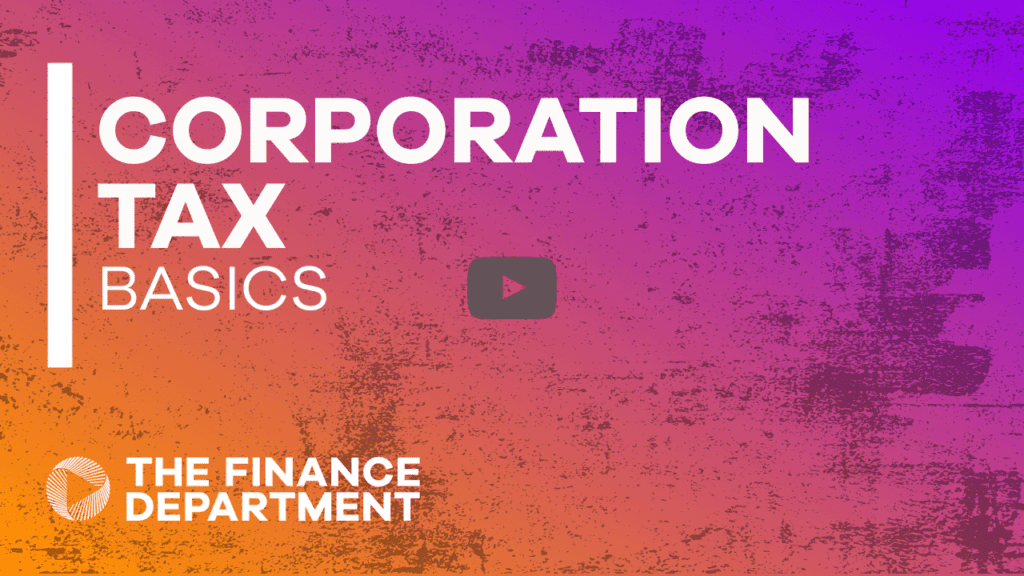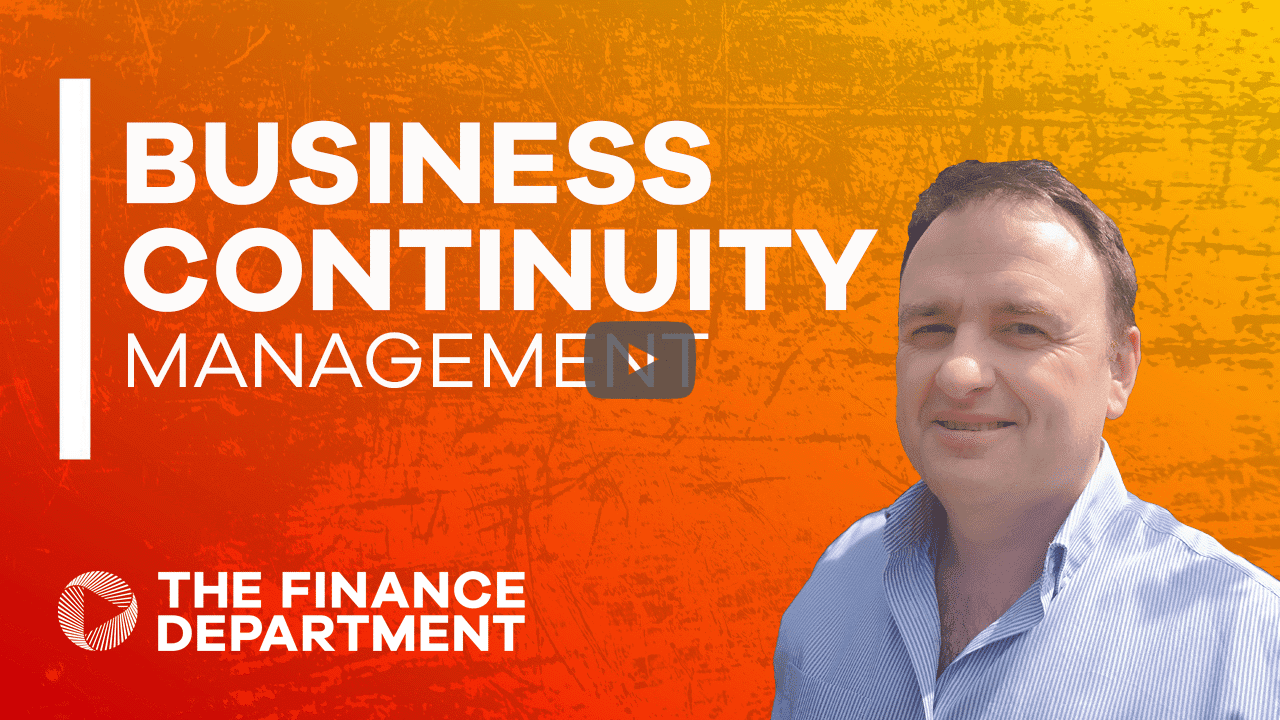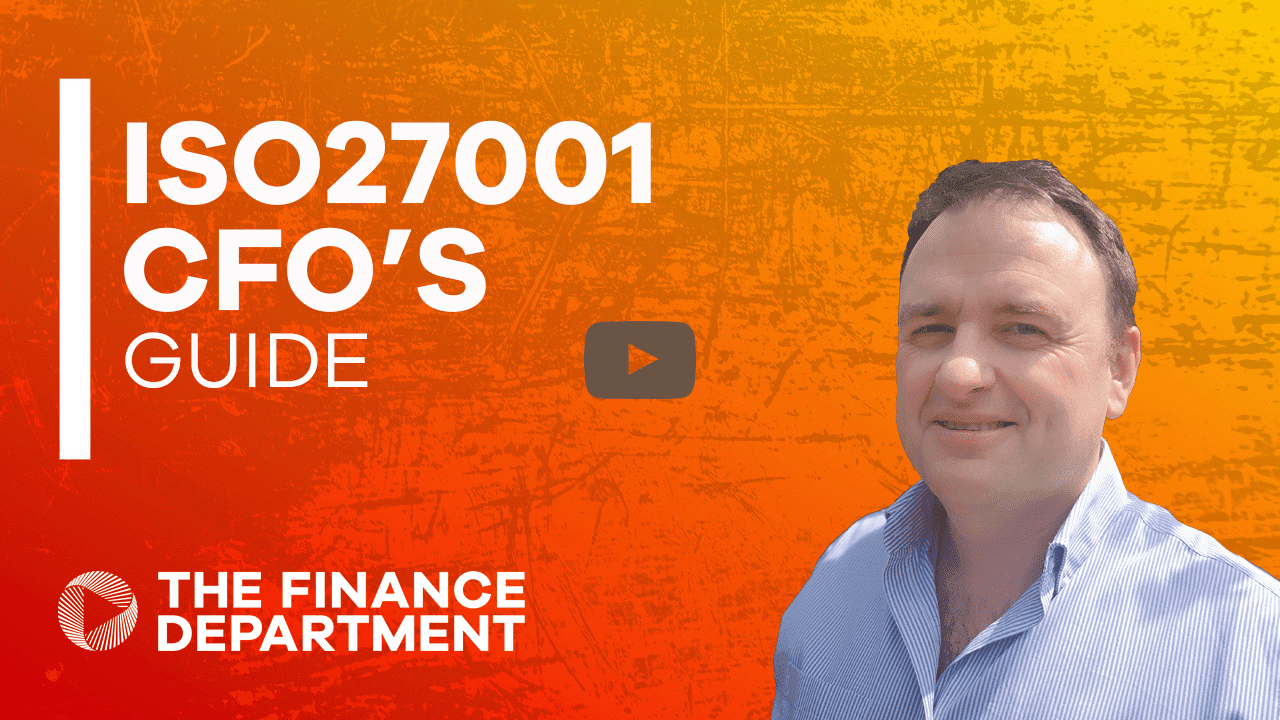Join today and start learning
TFD is the learning platform built for finance professionals.
This content is available as part of our bitesized video series.
Watch this video today by joining our free community.
Video : Corporation Tax Basics Explained for Small Business UK
Are you wondering how company tax works? Heard of ‘Corporation Tax’ but don’t know what it is? In this video, Dan runs you through all the must know info.
Have a limited company and wondering what corporation tax is all about? Well in this video I run you through the basics.
As a business accountant my team and I spent all day long helping business owners on their journey and of course a common topic is that of corporation tax. Now all corporation tax is, is the company’s tax bill that’s it it’s as simple as that really and in this video I’m going to run you through all the need to know information and at the end I’m going to touch on how you can reduce that tax bill.
Now of course during all these videos we do on this channel we’re interested in small business, so we’re not talking about multinationals or these large businesses, we’re talking about small owner managed business, which is the majority of the people that we deal with. Now before I get deep into this if you like these type of videos be sure to click the subscribe button below to get notified whenever we release another one.
So let’s get into it: What is corporation tax? Well, first off as I said I think that’s a good place to start and it’s the company’s tax bill it’s as simple as that we as individuals pay personal tax and without boring you with all the tax law that’s there let’s just call it the company’s tax, there’s a set of law that surrounds this and that’s it, so it’s calculated on a company corporation tax return, so there’s normally a set of accounts that the accountant generally will do in fall to a particular type of accounting standards and figures from that get translated into a corporation tax return, that’s the company’s tax return both go together electronically to the tax people and that’s a full set of accounts it shows like your turnover and it shows all your costs and everything that goes into that really to come back to the tax bill. Because sometimes accounting profit is different to the taxable profit you actually pay tax on, so the two are sort of one and the same but with various adjustments and they come out with a tax bill and that’s what your accountant will give you. But, that’s in essence what corporation tax is.
Now in terms of how it’s payable normally for a small business it’s due nine months and one year after the accounting period end. Now, let’s not get too technical with this because most of the time it’s going to run with the year end, so you’re going to trade for the year then it’s going to give you nine months and a day to pay it, so if you imagine if your year ends the 31st of March you’re going to have to the 1st of January the following year to pay your corporation tax bill.
Now, the only reason I mention accounting period is sometimes in the first year you might have a thing where you get two returns or there can be you’ve changed year-end or something like that and it can change the corporation tax date. But just to keep it simple just think nine months and a day for the majority of people out there.
In terms of how much is due, well it depends on the year and what they’ve set as the rate, so currently we’re enjoying quite a low rate of corporation tax here in the UK. So as we’re recording this video in 2020 the corporation tax is currently 19% of your profits so if you imagine all your sales and everything come in all your costs come off and then for whatever you’re allowed for tax reasons gives you a profit and that profit has 19% applied to it and that’s your tax bill.
Now, it was in previous years that what would happen is you’d have a, like a large company would pay a different amount to a small company, there was two separate rates, and all they did over the years is make that rate one so there’s no real difference at the moment whether we see a return to that at a later date who knows but the minute that’s where we’re at and it was actually going to go down to 17% just before coronavirus and everything else that happened this year. So just to give you some sort of idea it does change and it’s worth keeping an eye on the news to see how that can affect you and I’m sure if you’ve got a decent accountant they’ll be telling you when that when that occurs, but right now it’s quite a low rate.
Whether maybe there’s a time you can’t actually pay your bill and that’s okay there’s what they call a time to pay service, I think a lot of people use this during the coronavirus pandemic to delay their payments but actually it was available all the time anyway and you could just phone up let them know you’re in a bit of trouble you can’t pay it, and generally if you’ve got good reasons and you satisfied their criteria they’d give you time to pay, you know you can have like 12-month arrangements on direct debit and it will come out. So if you do get to that point and you don’t have enough to pay it then, that’s an option, what I would say though for me is it’s really critical to plan your tax all year because there’s a limited company because the money is not yours you should have that tax money in theory sort of sitting in the account.
Now depending on the style of business you are sometimes that’s not actually physically possible because you’re owed money from people and all the rest of it. So it can look okay on paper like you should in theory have the money to pay it, but you’ve not necessarily got the cash. But just giving you some idea you should be able to have that there so for me it’s really important to work with an accountant that can make sure that you know where you are sort of every quarter or something like that, so that you’ve got an understanding.
Now, that isn’t the norm that’s something I know we do and are passionate about, I think you need some sort of understanding. Also, some of the cloud softwares can give you an indication of what’s going on or just some up-to-date figures you could at least take the up-to-date figures and go 19% so you could see you know what you think roughly where you are even if it’s not completely as accurate as it would be if an accountant looked at it. But get that feeling and make sure that you’re planning for it, but if you can’t ultimately there is a way to do that and there is penalties and interest and the like for not paying it. But, normally if you’ve got time to pay arrangement they’re fairly minimal so just bear that in mind.
So in terms of how you actually pay it well the cheapest and easiest and HMRC’s preferred method is that you pay it online via online banking. So there’s a specific reference you use, and of course in our job every day we see someone that does get this wrong, so bear in mind to make sure you’re paying the right people with the right reference. Often if revenue and customers have sent you a slip to pay a letter saying this is your tax it will have a number on it, but normally your accountant will be supplying that with you, and actually the reference number changes each year for your accounting period, so just keep an eye on that reference make sure you pay it to the right place.
Now to finish off I want to talk about how you could potentially reduce this tax bill now, if you’ve heard me speak on this subject or followed us on social media, you’ll know that I massively believe that tax is a success fee it’s something that it’s a good problem to have because it means you’re doing well but I do believe in paying the absolute right amount that you can pay legally.
In the UK we have this thing where people in employment pay the right amount of tax, generally, I know there’s the old one of you’ll be like well that’s not true in this case but generally you pay the right amount of tax it’s very straightforward.
As a self-employed person or as a business owner of a limited company. You’ve got so much tax to contend with you’ve got no hope unless you get the right advice and knowledge, so and that’s where we stand is making sure that legally you’re using everything you can to make sure you’re paying the right amount of tax, which is normally less than what you would pay if you just did it yourself.
So, from that sense knowledge is absolutely key and what you’ve got here of course is you’ve got a YouTube channel full of tips and bits and pieces which is great you can if you’ve got an accountant see what they put out in terms of news and tips and things like that. Make sure you’re involved we’ve obviously got a newsletter, a podcast, and all the rest of it, so you can get some tips there, but generally try and surround yourself with knowledge, knowledge of what you can do, because accountants even good accountants can’t be in your head all the time, it’s really really important.
Outside of that keeping good records is the most important thing, so I know that sounds really really boring and kind of obvious that you need to keep good records but the amount of times people miss tax deductions because they’re not keeping their receipt. They’ve paid something cash out their pockets and then when they come around to writing up their books they’ve actually, or these days not writing them physically but electronically, and they’ve lost that tax deduction because they’ve actually forgot they even bought that cup of coffee or that bit stationary from the shop when they’re out about, so bear that in mind good records and good knowledge.
And of course there are a ton of opportunities for reducing tax in a limited company so please do your research.
And that’s it, so until the next one we’ll see you then.
At Heelan Associates we are passionate about business. Our team help small business owners all over the UK to start, survive and grow.
We do this by:
– Helping them to understand their business numbers so they can make better decisions
– Saving time & tax
– Providing trusted advice through our close relationship with them
Our services include accountancy, tax, book-keeping, payroll, construction industry and business advisory services.
Video: Corporation Tax Basics Explained for Small Business UK
Are you wondering how company tax works? Heard of ‘Corporation Tax’ but don’t know what it is? In this video, Dan runs you through all the must know info.
Have a limited company and wondering what corporation tax is all about? Well in this video I run you through the basics.
As a business accountant my team and I spent all day long helping business owners on their journey and of course a common topic is that of corporation tax. Now all corporation tax is, is the company’s tax bill that’s it it’s as simple as that really and in this video I’m going to run you through all the need to know information and at the end I’m going to touch on how you can reduce that tax bill.
Now of course during all these videos we do on this channel we’re interested in small business, so we’re not talking about multinationals or these large businesses, we’re talking about small owner managed business, which is the majority of the people that we deal with. Now before I get deep into this if you like these type of videos be sure to click the subscribe button below to get notified whenever we release another one.
So let’s get into it: What is corporation tax? Well, first off as I said I think that’s a good place to start and it’s the company’s tax bill it’s as simple as that we as individuals pay personal tax and without boring you with all the tax law that’s there let’s just call it the company’s tax, there’s a set of law that surrounds this and that’s it, so it’s calculated on a company corporation tax return, so there’s normally a set of accounts that the accountant generally will do in fall to a particular type of accounting standards and figures from that get translated into a corporation tax return, that’s the company’s tax return both go together electronically to the tax people and that’s a full set of accounts it shows like your turnover and it shows all your costs and everything that goes into that really to come back to the tax bill. Because sometimes accounting profit is different to the taxable profit you actually pay tax on, so the two are sort of one and the same but with various adjustments and they come out with a tax bill and that’s what your accountant will give you. But, that’s in essence what corporation tax is.
Now in terms of how it’s payable normally for a small business it’s due nine months and one year after the accounting period end. Now, let’s not get too technical with this because most of the time it’s going to run with the year end, so you’re going to trade for the year then it’s going to give you nine months and a day to pay it, so if you imagine if your year ends the 31st of March you’re going to have to the 1st of January the following year to pay your corporation tax bill.
Now, the only reason I mention accounting period is sometimes in the first year you might have a thing where you get two returns or there can be you’ve changed year-end or something like that and it can change the corporation tax date. But just to keep it simple just think nine months and a day for the majority of people out there.
In terms of how much is due, well it depends on the year and what they’ve set as the rate, so currently we’re enjoying quite a low rate of corporation tax here in the UK. So as we’re recording this video in 2020 the corporation tax is currently 19% of your profits so if you imagine all your sales and everything come in all your costs come off and then for whatever you’re allowed for tax reasons gives you a profit and that profit has 19% applied to it and that’s your tax bill.
Now, it was in previous years that what would happen is you’d have a, like a large company would pay a different amount to a small company, there was two separate rates, and all they did over the years is make that rate one so there’s no real difference at the moment whether we see a return to that at a later date who knows but the minute that’s where we’re at and it was actually going to go down to 17% just before coronavirus and everything else that happened this year. So just to give you some sort of idea it does change and it’s worth keeping an eye on the news to see how that can affect you and I’m sure if you’ve got a decent accountant they’ll be telling you when that when that occurs, but right now it’s quite a low rate.
Whether maybe there’s a time you can’t actually pay your bill and that’s okay there’s what they call a time to pay service, I think a lot of people use this during the coronavirus pandemic to delay their payments but actually it was available all the time anyway and you could just phone up let them know you’re in a bit of trouble you can’t pay it, and generally if you’ve got good reasons and you satisfied their criteria they’d give you time to pay, you know you can have like 12-month arrangements on direct debit and it will come out. So if you do get to that point and you don’t have enough to pay it then, that’s an option, what I would say though for me is it’s really critical to plan your tax all year because there’s a limited company because the money is not yours you should have that tax money in theory sort of sitting in the account.
Now depending on the style of business you are sometimes that’s not actually physically possible because you’re owed money from people and all the rest of it. So it can look okay on paper like you should in theory have the money to pay it, but you’ve not necessarily got the cash. But just giving you some idea you should be able to have that there so for me it’s really important to work with an accountant that can make sure that you know where you are sort of every quarter or something like that, so that you’ve got an understanding.
Now, that isn’t the norm that’s something I know we do and are passionate about, I think you need some sort of understanding. Also, some of the cloud softwares can give you an indication of what’s going on or just some up-to-date figures you could at least take the up-to-date figures and go 19% so you could see you know what you think roughly where you are even if it’s not completely as accurate as it would be if an accountant looked at it. But get that feeling and make sure that you’re planning for it, but if you can’t ultimately there is a way to do that and there is penalties and interest and the like for not paying it. But, normally if you’ve got time to pay arrangement they’re fairly minimal so just bear that in mind.
So in terms of how you actually pay it well the cheapest and easiest and HMRC’s preferred method is that you pay it online via online banking. So there’s a specific reference you use, and of course in our job every day we see someone that does get this wrong, so bear in mind to make sure you’re paying the right people with the right reference. Often if revenue and customers have sent you a slip to pay a letter saying this is your tax it will have a number on it, but normally your accountant will be supplying that with you, and actually the reference number changes each year for your accounting period, so just keep an eye on that reference make sure you pay it to the right place.
Now to finish off I want to talk about how you could potentially reduce this tax bill now, if you’ve heard me speak on this subject or followed us on social media, you’ll know that I massively believe that tax is a success fee it’s something that it’s a good problem to have because it means you’re doing well but I do believe in paying the absolute right amount that you can pay legally.
In the UK we have this thing where people in employment pay the right amount of tax, generally, I know there’s the old one of you’ll be like well that’s not true in this case but generally you pay the right amount of tax it’s very straightforward.
As a self-employed person or as a business owner of a limited company. You’ve got so much tax to contend with you’ve got no hope unless you get the right advice and knowledge, so and that’s where we stand is making sure that legally you’re using everything you can to make sure you’re paying the right amount of tax, which is normally less than what you would pay if you just did it yourself.
So, from that sense knowledge is absolutely key and what you’ve got here of course is you’ve got a YouTube channel full of tips and bits and pieces which is great you can if you’ve got an accountant see what they put out in terms of news and tips and things like that. Make sure you’re involved we’ve obviously got a newsletter, a podcast, and all the rest of it, so you can get some tips there, but generally try and surround yourself with knowledge, knowledge of what you can do, because accountants even good accountants can’t be in your head all the time, it’s really really important.
Outside of that keeping good records is the most important thing, so I know that sounds really really boring and kind of obvious that you need to keep good records but the amount of times people miss tax deductions because they’re not keeping their receipt. They’ve paid something cash out their pockets and then when they come around to writing up their books they’ve actually, or these days not writing them physically but electronically, and they’ve lost that tax deduction because they’ve actually forgot they even bought that cup of coffee or that bit stationary from the shop when they’re out about, so bear that in mind good records and good knowledge.
And of course there are a ton of opportunities for reducing tax in a limited company so please do your research.
And that’s it, so until the next one we’ll see you then.
At Heelan Associates we are passionate about business. Our team help small business owners all over the UK to start, survive and grow.
We do this by:
– Helping them to understand their business numbers so they can make better decisions
– Saving time & tax
– Providing trusted advice through our close relationship with them
Our services include accountancy, tax, book-keeping, payroll, construction industry and business advisory services.










